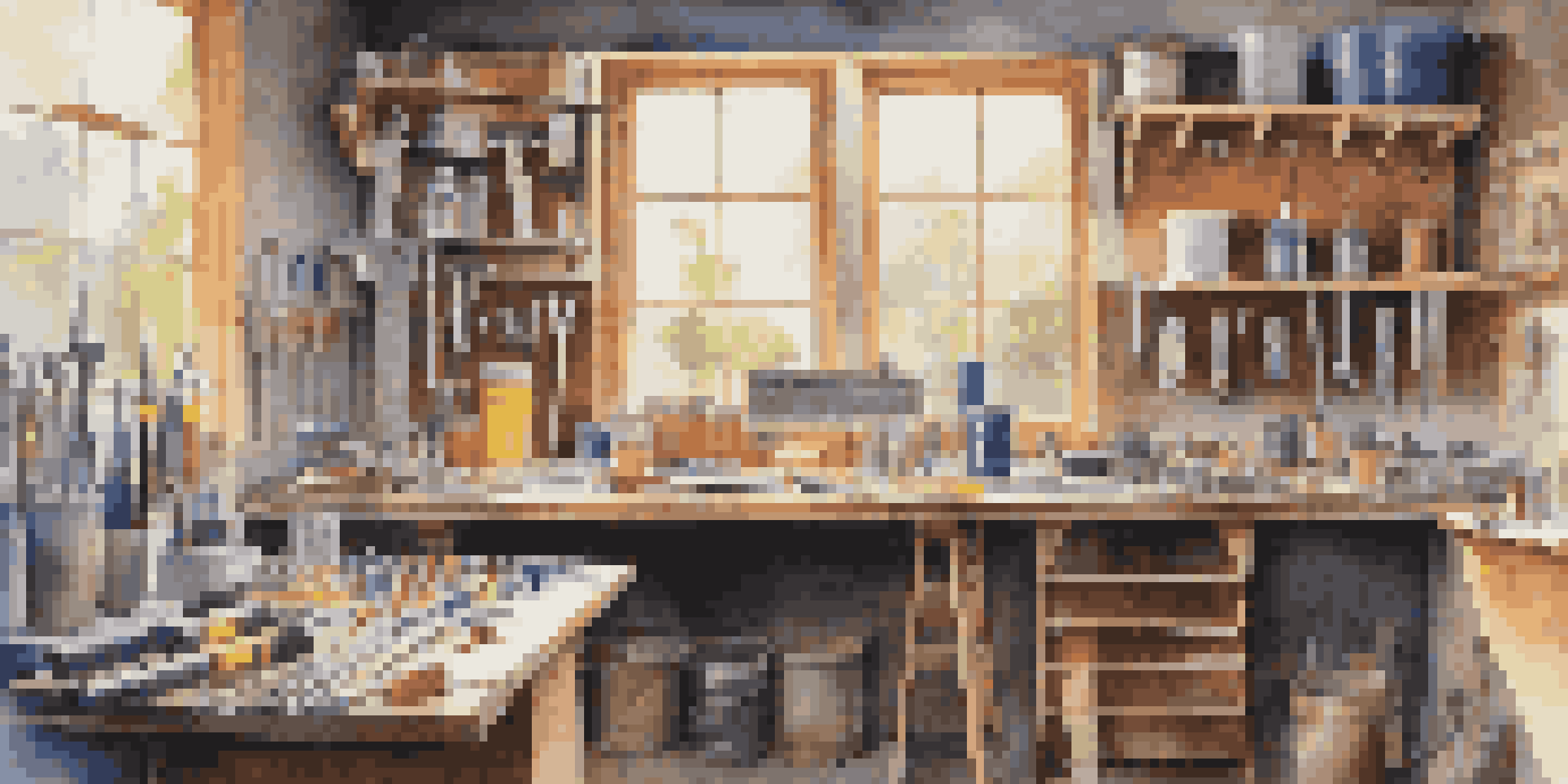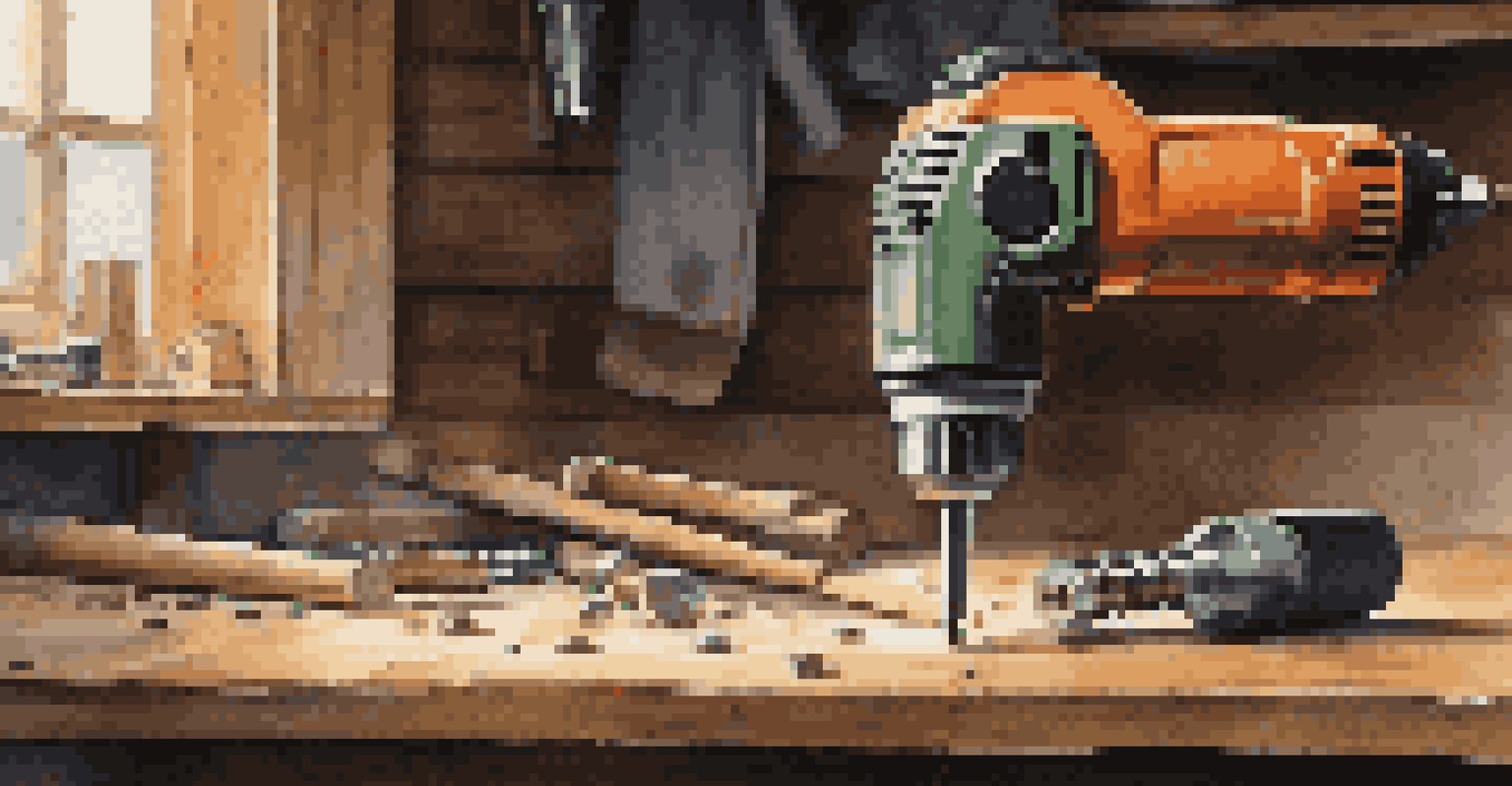Indispensable Tools for Homeowners: Building Your Collection

The Importance of a Basic Tool Set for Homeowners
Every homeowner should start with a basic tool set, as it lays the foundation for tackling various tasks around the house. Think of these tools as your trusty sidekicks; they’ll help you repair, build, and maintain your home efficiently. A well-rounded tool set not only saves you time but also money, as you won't need to hire someone for simple fixes.
The best way to predict the future is to create it.
Common tools like a hammer, screwdriver, and pliers should be the first additions to your collection. These items are versatile and can be used for a multitude of jobs, from assembling furniture to hanging pictures on the wall. Investing in quality tools means they will last longer and perform better, ensuring you're ready for any home improvement challenge.
Overall, having a solid basic tool set empowers you to take on projects with confidence. It gives you the flexibility to address unexpected repairs and enhances your DIY skills over time. Plus, there’s a certain satisfaction that comes from using your tools to create or fix something with your own hands.
Must-Have Hand Tools for Everyday Tasks
Hand tools are the backbone of any homeowner's toolkit and should be versatile enough to handle everyday tasks. Think of tools like wrenches, tape measures, and utility knives, which can be used for a variety of jobs around the house. These tools are essential for both minor repairs and larger projects, making them indispensable.

For example, a tape measure is crucial when you're planning to rearrange furniture or hang curtains, ensuring everything fits perfectly. Meanwhile, a quality utility knife can help you open boxes, cut materials, or even craft simple projects. The convenience and efficiency of these hand tools mean you’ll always be prepared for whatever tasks come your way.
Build a Basic Tool Set
Every homeowner should start with a basic tool set to efficiently tackle repairs and maintenance tasks.
By having a selection of hand tools readily available, you can tackle almost any home task with ease. It not only streamlines your workflow but also minimizes the frustration of searching for the right tool when you need it. Remember, the right tools can make even the most tedious jobs more manageable.
Power Tools: Boosting Your Efficiency and Creativity
As you grow more comfortable with DIY projects, incorporating power tools into your collection can significantly boost your efficiency. Power tools, such as drills, saws, and sanders, allow for quicker and more precise work compared to their hand-tool counterparts. They can transform an afternoon project into a quick task, giving you more time to enjoy your space.
It's not about having the right opportunities. It's about handling the opportunities right.
For instance, an electric drill is a game-changer for any homeowner. Instead of twisting screws by hand, this tool allows you to quickly drive screws into walls or wood, making installations a breeze. Similarly, a circular saw enables you to cut through wood with ease, perfect for building furniture or home improvements.
While power tools can seem intimidating at first, they become invaluable as you tackle bigger projects. Getting familiar with them not only enhances your skillset but also opens up a world of creative possibilities for home improvements. Just remember to prioritize safety and read the manuals to ensure you use them effectively.
Safety Gear: Protecting Yourself While You Work
Safety should always be a top priority for homeowners, especially when using tools and handling materials. Investing in appropriate safety gear is crucial to protect yourself from accidents and injuries. This includes items like goggles, gloves, and ear protection, which should be part of your toolkit.
For example, goggles shield your eyes from dust and debris while you're working, especially when cutting wood or using power tools. Ear protection is equally important when operating loud machinery, as prolonged exposure can lead to hearing loss. Wearing gloves not only protects your hands but also provides a better grip on tools and materials.
Prioritize Safety Gear
Investing in appropriate safety gear is crucial to protect yourself while working with tools and materials.
Having the right safety gear gives you peace of mind, allowing you to focus on the task at hand without worrying about potential hazards. It’s wise to make safety a habit, ensuring you’re always equipped to handle your projects safely. Remember, no project is worth risking your well-being.
Organizing Your Tool Collection for Easy Access
Once you've built your collection of tools, organizing them becomes essential for efficiency and ease of use. A well-organized toolkit prevents frustration and saves time when searching for the right tool for the job. Consider investing in a toolbox, pegboard, or storage bins to keep everything in its place.
For instance, a toolbox with multiple compartments can help you categorize your tools, making it easier to find what you need. Pegboards are also a fantastic solution for visual organization; they allow you to hang tools on the wall, keeping them within reach while showcasing your collection. Having a designated space for each tool means you’ll always know where to find them.
Regularly organizing your tools not only makes your workspace safer but also encourages you to tackle projects more often. When everything is neatly stored, you’re more likely to jump into a DIY task rather than put it off. Plus, an organized space can inspire creativity and motivate you to take on new challenges.
Maintenance Tips for Keeping Your Tools in Top Shape
Just like any other valuable possession, your tools require regular maintenance to keep them in top shape. Taking care of your equipment ensures they last longer and perform better, ultimately saving you money in the long run. Simple upkeep tasks, such as cleaning and oiling, go a long way in extending the life of your tools.
For example, after each use, it’s a good practice to wipe down your tools to remove dirt and moisture. This helps prevent rust and keeps them looking new. Additionally, periodically oiling moving parts, like drills or saws, can prevent wear and tear, ensuring they operate smoothly when you need them.
Maintain Your Tools Regularly
Regular maintenance of tools ensures their longevity and optimal performance, enhancing your DIY experience.
By incorporating maintenance into your routine, you’ll develop a deeper appreciation for your tools and how they function. It also prepares you for the next project, knowing that your equipment is ready to perform at its best. Remember, well-maintained tools make for a safer and more enjoyable DIY experience.
Expanding Your Tool Collection as You Grow
As your skills improve and your confidence grows, you might find the need to expand your tool collection. This can include specialized tools tailored to specific projects or advanced versions of the tools you already own. The key is to invest in quality tools that complement your existing collection and enhance your capabilities.
For instance, if you enjoy woodworking, consider adding chisels, clamps, or a miter saw to your toolkit. For plumbing tasks, a pipe wrench or a plumbing snake could prove invaluable. Each new tool opens up new possibilities for projects, allowing you to tackle more complex tasks and express your creativity.

As you expand your collection, remember to focus on tools that you will actually use and that fit your current skill level. It’s easy to get carried away with flashy gadgets, but practicality should always be your guide. Gradually building your collection will help you develop your DIY skills without feeling overwhelmed.